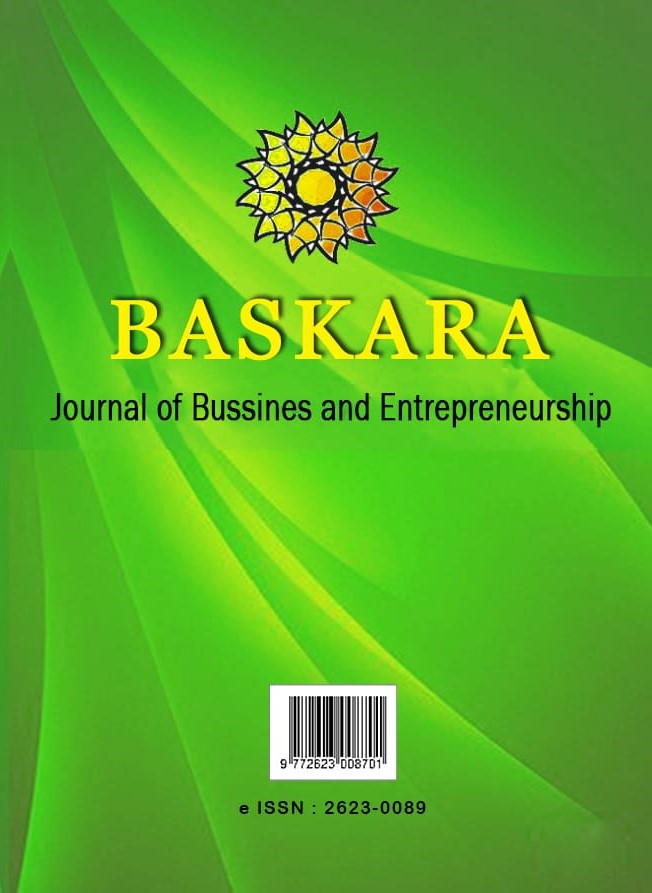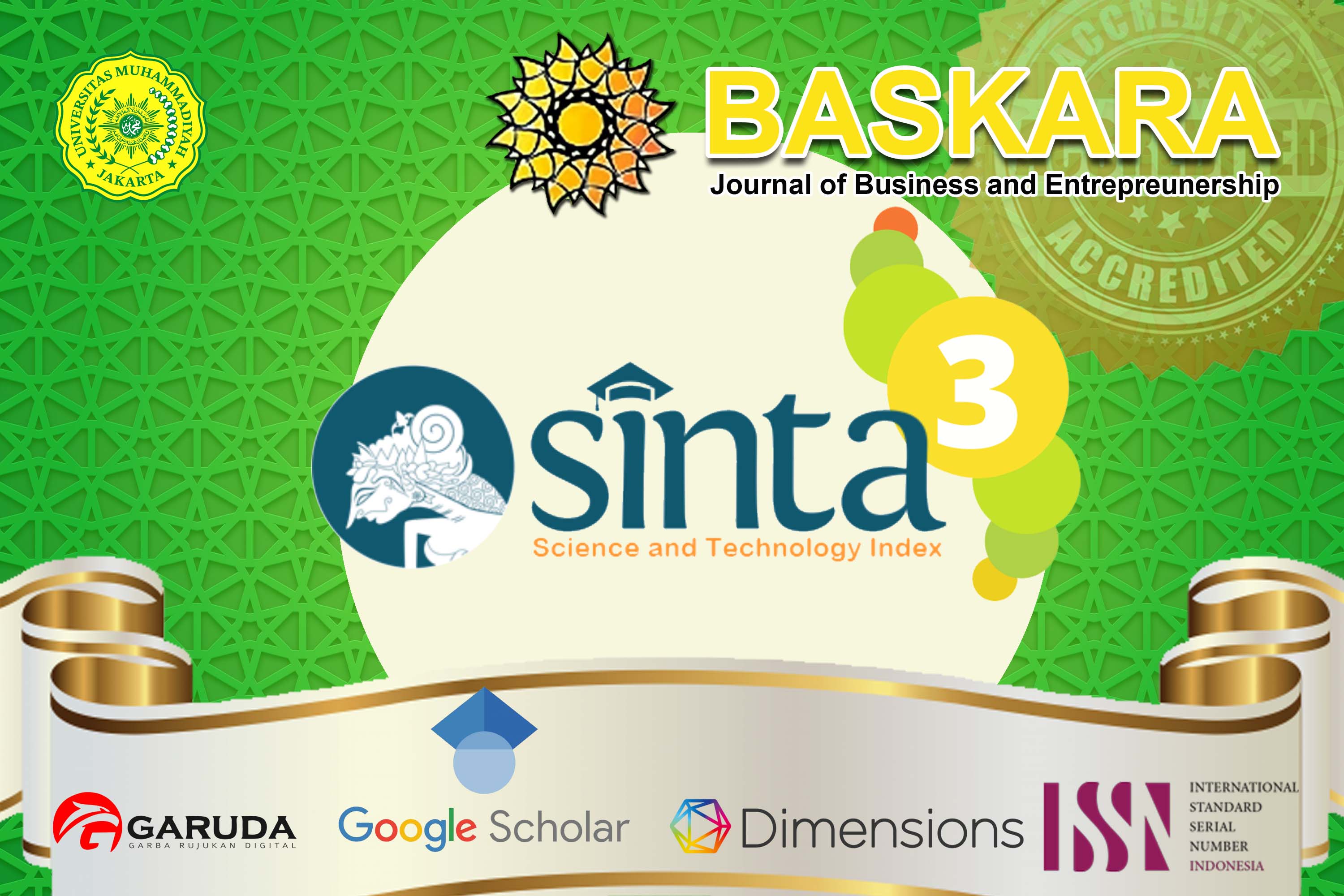Implementation of Musyarakah Financing in BMT Al-Munawarah
DOI:
https://doi.org/10.54268/baskara.v5i2.12787Keywords:
Musharakah, Musharakah Financing, BMT, Marketing Strategy.Abstract
This study aims to determine the application and conformity of the sharia musharakah contract with the DSN fatwa at Baitul Maal wa Tamwil (BMT) Al-Munawwarah, using a qualitative case study approach. The data used in this study used primary and secondary data by conducting direct interviews with branch managers, tellers, and customers at BMT and searching for data sources in journals, books, and literature. The results of this study explain that BMT has several savings products and financing products in it for customer needs. In conducting Musyarakah financing, customers need to fill out a form and complete the requirements set by the BMT. In its implementation, BMT Al-Munawwarah has run musharakah financing following the DSN-MUI Fatwa with the principle of profit sharing. The ratios that are usually used for BMT are 50%: 50%, 60%: 40%, and 70%: 30%. The marketing strategy used by BMT in marketing its financing products is through print media such as brochures, and bannersReferences
Algoud, Latifa M., and Mervyn K Lewis. 2007. Islamic Banking. Jakarta: Jakarta: Serambi Ilmu Semesta.
Antonio, Muhammad Syafi’i. 2001. Bank Syariah: Dari Teori Ke Praktek. Jakarta: Jakarta: Gema Insani Press.
Ascarya, and Diana Yumanita. 2005. Bank Syariah: Gambaran Umum. Jakarta: Jakarta: Pusat Pendidikan dan Studi Kebanksentralan (PPSK) Bank Indonesia.
Basyariah, Nuhbatul. 2018. “Analisis Implementasi Pembiayaan Musyarakah Mutanaqishah Pada Perbankan Syariah Di Indonesia.” Muqtasid: Jurnal Ekonomi Dan Perbankan Syariah 9 (2): 120. https://doi.org/10.18326/muqtasid.v9i2.120-133.
Buchari, Nur Syamsudin. 2012. Koperasi Syariah Teori Dan Praktik. Banten: Banten: Shuhuf Media Insani.
Fajar. 2018. “Mekanisme Eksekusi Jaminan Pada Pembiayaan Musyarakah Di BMT UGT Sidogiri Bangkalan Dalam Perpektif Hukum Bisnis Syari’ah.” Az Zarqa’: Jurnal Hukum Bisnis Islam 10 (2): 324–36.
Hadiyati, Puji. 2013. “Pengaruh Non Performing Finance Pembiayaan Mudharabah Dan Musyarakah Pada Bank Muamalat Indonesia.” E-Jurnal Manajemen Dan Bisnis 1 (1): 1–14.
Hanjani, Andreani, Andika Ranto Pratama, and Parwoto Parwoto. 2019. “Penerapan PSAK No. 106 Pada Pembiayaan Musyarakah Di BMT Batik Mataram.” Jati: Jurnal Akuntansi Terapan Indonesia 2 (2): 48–52. https://doi.org/10.18196/jati.020217.
Hasanudin, M., and Jaih Mubarok. 2012. Perkembangan Akad Musyarakah. Jakarta: Kencana.
Ikatan Akuntan Indonesia. 2007. Pernyataan Standar Akuntansi Keuangan (PSAK) 106 Tentang Pembiayaan Musyarakah. Jakarta: Jakarta: Dewan Standar Akuntansi Keuangan Ikatan Akuntan Indonesia.
Isfiyanti, Silvia, Rozmita Dewi Yuniarti, and Rumaisah Azizah Al Adawiyah. 2020. “Pengaruh Risiko Pembiayaan Akad Murabahah, Musyarakah, Dan Mudharabah Terhadap Profitabilitas BPRS Di Indonesia Tahun 2011-2019.” Ekspansi: Jurnal Ekonomi, Keuangan, Perbankan Dan Akuntansi 12 (1): 105–18. https://doi.org/10.35313/ekspansi.v12i1.1926.
Jaharuddin. 2018. Kapita Selekta Pemikiran Ekonomi Islam. Banten: Pustakapedia.
Jaharuddin, and Bambang Sutrisno. 2018. Pengantar Ekonomi Islam. Jakarta: Salemba Diniyah.
Karim, Adiwarman. 2006. Bank Islam Analisis Fiqh Dan Keuangan. Jakarta: Jakarta: PT. Raja Grafindo Persada.
Kurniasari, Shinta Amelia, and Risma Wira Bharata. 2020. “Penerapan Pembiayaan Musyarakah Pada BMT Dana Barokah Muntilan.” JAS (Jurnal Akuntansi Syariah) 4 (2): 181–95. https://doi.org/10.46367/jas.v4i2.240.
Linaria, and Aprina Chintya. 2017. “Penerapan PSAK No. 106 Pada Perlakuan Akuntansi Musyarakah Di BMT Al-Ihsan Metro Lampung.” Jurnal Ekonomi Syariah 5 (106): 32–46.
Mardani. 2012. Fiqh Ekonomi Syariah. Jakarta: Kencana.
Mazlan. 2013. Fiqh Muamalat Ar-Rahnu. Jakarta: Jakarta: Prenamedia Group.
Melina, Ficha. 2020. “Pembiayaan Murabahah Di Baitul Maal Wat Tamwil (BMT).” Jurnal Tabarru’: Islamic Banking and Finance 3 (2): 269–80. https://doi.org/10.25299/jtb.2020.vol3(2).5878.
Ridwan, Hasan Ahmad. 2013. Manajemen Baitul Maal Wat Tamwil. Bandung: Bandung: CV Pustaka Setia.
Sahroni, Sohari. 2011. Fikih Muamalah. Bogor: Ghalia Indonesia.
Saryono. 2010. Metode Penelitian Kualitatif. Bandung: Bandung: PT. Alfabeta.
Soemitra, Andri. 2017. Bank Dan Lembaga Keuangan Syariah. Jakarta: Jakarta: Prenada Media.
Suhardi, Komaruddin, Asyari Hasan, and Mega Oktaviany. 2022. “Implementasi Akad Mudharabah Dan Musyarakah Pada Teknologi Finansial Syariah Dengan Pendekatan Kemaslahatan.” Al-Mashrafiyah: Jurnal Ekonomi, Keuangan Dan Perbankan Syariah 6 (1): 105.
Taufiqulhakim, Amirul, and Achsania Hendratmi. 2019. “Penerapan Syirkah Melalui Akad Musyarakah Basmalah Sidogiri Pasuruan.” Jurnal Ekonomi Syariah Teori Dan Terapan 6 (10): 2143. https://doi.org/10.20473/vol6iss201910pp2143-2157.
Wahidullah, Adibatul Hafidlah, and Jumaiyah. 2019. “Konsep Akad Musyarokah (Sebuah Telaah Kritis Penerapan Akad Musyarokah).”
Human Falah: Jurnal Ekonomi Dan Bisnis Islam 6 (2): 159–80.
Wahyuni, Nur. 2019. “Praktek Pembiayaan Musyarakah Pada Lembaga Keuangan Syari’ah.” EKSYAR: Jurnal Ekonomi Syari’ah & Bisnis Islam 06 (Vol 6 No 02 (2019): Jurnal Ekonomi Syariah & Bisnis Islam): 148–61. http://ejournal.staim-tulungagung.ac.id/index.php/Eksyar/article/view/40
Downloads
Published
Issue
Section
License
In order for Baskara: Journal of Business and Entrepreneurship to publish and disseminate research articles, we need publishing rights (transfered from author(s) to publisher). This is determined by a publishing agreement between the Author(s) and Baskara Journal. This agreement deals with the transfer or license of the copyright of publishing to Baskara: Journal of Business and Entrepreneurship, while Authors still retain significant rights to use and share their own published articles. Baskara : Journal of Business and Entrepreneurship supports the need for authors to share, disseminate and maximize the impact of their research and these rights, in any databases.
As a journal Author, you have rights for a large range of uses of your article, including use by your employing institute or company. These Author rights can be exercised without the need to obtain specific permission. Authors publishing in Baskara : Journal of Business and Entrepreneurship have wide rights to use their works for teaching and scholarly purposes without needing to seek permission, including:
- use for classroom teaching by Author or Author's institution and presentation at a meeting or conference and distributing copies to attendees;
- use for internal training by author's company;
- distribution to colleagues for their reseearch use;
- use in a subsequent compilation of the author's works;
- inclusion in a thesis or dissertation;
- reuse of portions or extracts from the article in other works (with full acknowledgement of final article);
- preparation of derivative works (other than commercial purposes) (with full acknowledgement of final article);
- voluntary posting on open web sites operated by author or author’s institution for scholarly purposes.
Copyright Transfer Agreement for Publishing (Publishing Right)
The Authors who submit manuscript has to understand that if accepted for publication, mean that all copyright and publishing right of the article shall be assigned/transferred to Baskara: Journal of Business and Entrepreneurship as assigned publisher.
- CC BY-NC: This license allows reusers to distribute, remix, adapt, and build upon the material in any medium or format for noncommercial purposes only, and only so long as attribution is given to the creator.
It includes the following elements:
BY ![]() – Credit must be given to the creator
– Credit must be given to the creator
NC ![]() – Only noncommercial uses of the work are permitted
– Only noncommercial uses of the work are permitted
Baskara (C) Copyright (2022):
BASKARA: Journal of Business and Entrepreneurship by https://jurnal.umj.ac.id/index.php/baskara
is licensed under a Creative Commons Attribution-NonCommercial 4.0 International License








